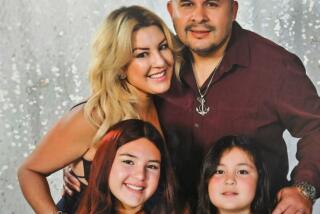Brother Tells Panel El Toro Marine Was Murder Victim
- Share via
WASHINGTON — When Col. James Sabow was found dead of a shotgun blast at the El Toro Marine Corps Air Station, the military said it was a simple case of a man killing himself to avoid embarrassment.
But his brother, a South Dakota neurosurgeon, says he can prove it was murder--one of dozens of cases where family members allege that sloppy or fraudulent military investigations led to rulings of self-inflicted deaths.
“These notions are not the delusions of despondent relatives. They are not the ravings of conspiracy theorists,” John David Sabow told a Senate Armed Services subcommittee Thursday.
In some cases, such as Col. Sabow’s, the relatives allege that military investigators ignored or suppressed evidence that show they were murders, not suicides. In other instances, relatives allege that military investigators were sloppy or didn’t intervene when civilian authorities allegedly mishandled cases.
“The time for excuses and insensitivity toward the families of those who die while in service to their country must end now,” said retired Army Col. William Cavanaugh, whose son’s death in 1983 while in the Air Force was ruled a suicide.
A federal appeals court last month reinstated part of a lawsuit by the Sabow family against the El Toro Marine base. The colonel’s brother hopes to use the lawsuit to force the Marine Corps to release evidence in the case.
The colonel was a decorated Vietnam combat pilot and the newly appointed acting chief of staff for Marine aircraft operations in the western United States.
Military investigators ruled that Sabow had committed suicide, noting that he had been told a week earlier that he was a possible target of an investigation into improper personal use of Marine Corps aircraft.
But his brother says the charges weren’t serious--the colonel allegedly had shipped a set of speakers to his son aboard a Marine training flight--and that the autopsy and other evidence points to murder.
Among other things, the autopsy showed that the colonel had suffered a severe blow to the head before the point-blank shotgun blast.
More to Read
Sign up for Essential California
The most important California stories and recommendations in your inbox every morning.
You may occasionally receive promotional content from the Los Angeles Times.











